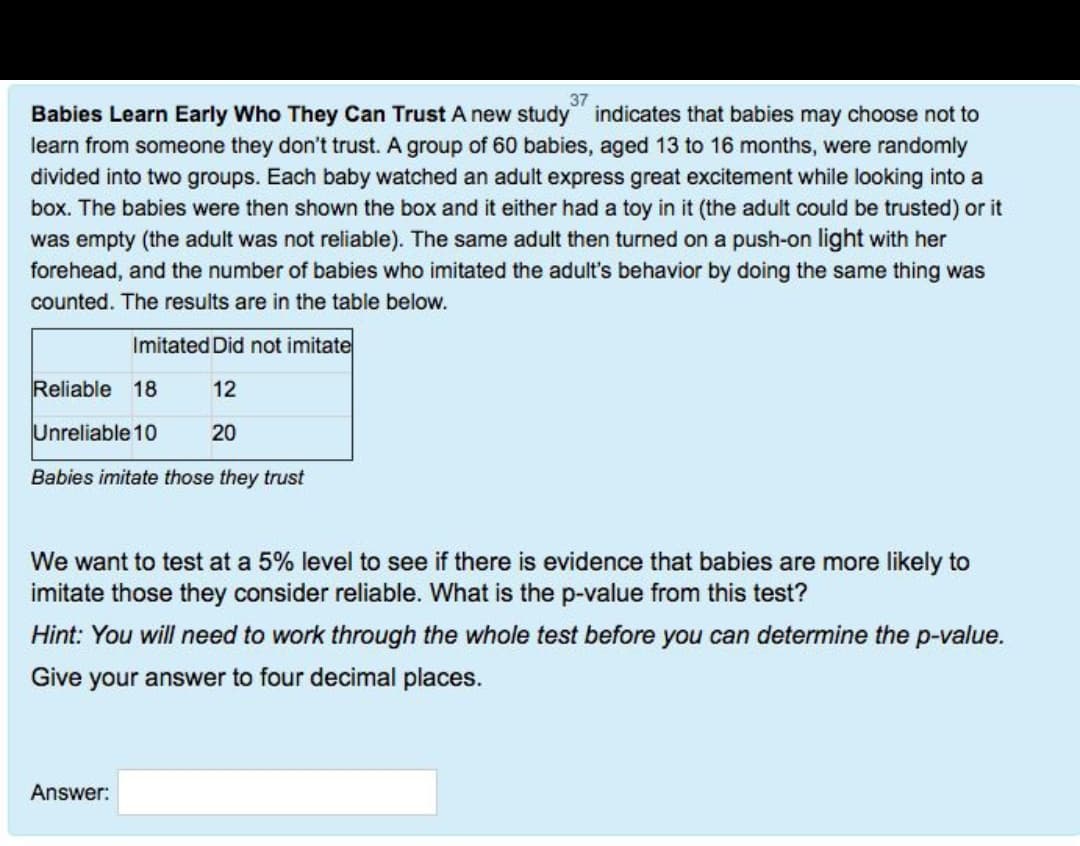Babies Learn Early Who They Can Trust A new study indicates that babies may choose not to learn from someone they don't trust. A group of 60 babies, aged 13 to 16 months, were randomly divided into two groups. Each baby watched an adult express great excitement while looking into a box. The babies were then shown the box and it either had a toy in it (the adult could be trusted) or it was empty (the adult was not reliable). The same adult then turned on a push-on light with her forehead, and the number of babies who imitated the adult's behavior by doing the same thing was counted. The results are in the table below. Imitated Did not imitate 12 20 Reliable 18 Unreliable 10 Babies imitate those they trust We want to test at a 5% level to see if there is evidence that babies are more likely to imitate those they consider reliable. What is the p-value from this test? Hint: You will need to work through the whole test before you can determine the p-value. Give your answer to four decimal places. Answer:
Babies Learn Early Who They Can Trust A new study indicates that babies may choose not to learn from someone they don't trust. A group of 60 babies, aged 13 to 16 months, were randomly divided into two groups. Each baby watched an adult express great excitement while looking into a box. The babies were then shown the box and it either had a toy in it (the adult could be trusted) or it was empty (the adult was not reliable). The same adult then turned on a push-on light with her forehead, and the number of babies who imitated the adult's behavior by doing the same thing was counted. The results are in the table below. Imitated Did not imitate 12 20 Reliable 18 Unreliable 10 Babies imitate those they trust We want to test at a 5% level to see if there is evidence that babies are more likely to imitate those they consider reliable. What is the p-value from this test? Hint: You will need to work through the whole test before you can determine the p-value. Give your answer to four decimal places. Answer:
Algebra & Trigonometry with Analytic Geometry
13th Edition
ISBN:9781133382119
Author:Swokowski
Publisher:Swokowski
Chapter10: Sequences, Series, And Probability
Section10.8: Probability
Problem 59E
Related questions
Question
Please sir if you can't solve stepwise with explanation in each step and also given information and final answer Along with the concept and also showing excel formula (wherever needed) please skip , if yes pls solve ill definitely rate the solution and dont do handwritten .

Transcribed Image Text:37
Babies Learn Early Who They Can Trust A new study indicates that babies may choose not to
learn from someone they don't trust. A group of 60 babies, aged 13 to 16 months, were randomly
divided into two groups. Each baby watched an adult express great excitement while looking into a
box. The babies were then shown the box and it either had a toy in it (the adult could be trusted) or it
was empty (the adult was not reliable). The same adult then turned on a push-on light with her
forehead, and the number of babies who imitated the adult's behavior by doing the same thing was
counted. The results are in the table below.
Imitated Did not imitate
12
20
Reliable 18
Unreliable 10
Babies imitate those they trust
We want to test at a 5% level to see if there is evidence that babies are more likely to
imitate those they consider reliable. What is the p-value from this test?
Hint: You will need to work through the whole test before you can determine the p-value.
Give your answer to four decimal places.
Answer:
Expert Solution
This question has been solved!
Explore an expertly crafted, step-by-step solution for a thorough understanding of key concepts.
This is a popular solution!
Trending now
This is a popular solution!
Step by step
Solved in 4 steps with 3 images

Recommended textbooks for you

Algebra & Trigonometry with Analytic Geometry
Algebra
ISBN:
9781133382119
Author:
Swokowski
Publisher:
Cengage

College Algebra (MindTap Course List)
Algebra
ISBN:
9781305652231
Author:
R. David Gustafson, Jeff Hughes
Publisher:
Cengage Learning

Algebra & Trigonometry with Analytic Geometry
Algebra
ISBN:
9781133382119
Author:
Swokowski
Publisher:
Cengage

College Algebra (MindTap Course List)
Algebra
ISBN:
9781305652231
Author:
R. David Gustafson, Jeff Hughes
Publisher:
Cengage Learning